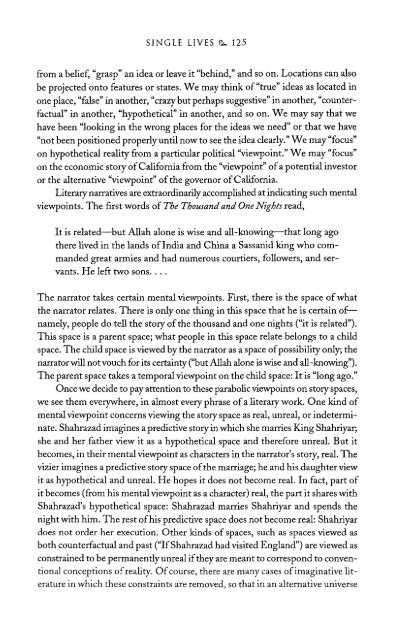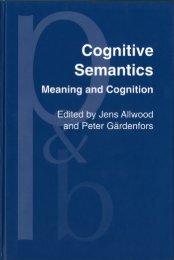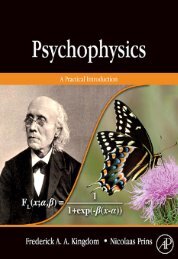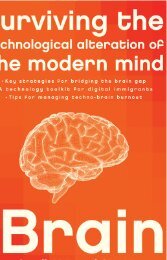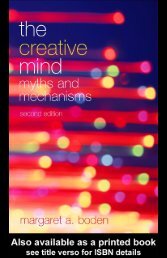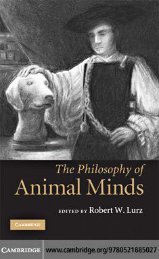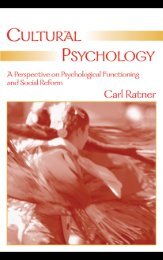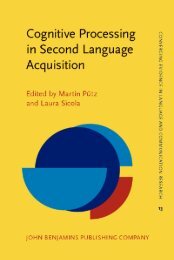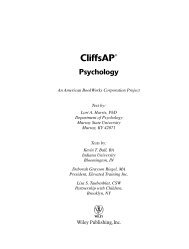The Literary Mind.pdf
The Literary Mind.pdf
The Literary Mind.pdf
You also want an ePaper? Increase the reach of your titles
YUMPU automatically turns print PDFs into web optimized ePapers that Google loves.
SINGLE LIVES 125<br />
from a belief, "grasp" an idea or leave it "behind," and so on. Locations can also<br />
be projected onto features or states. We may think of "true" ideas as located in<br />
one place, "false" in another, "crazy but perhaps suggestive" in another, "counterfactual"<br />
in another, "hypothetical" in another, and so on. We may say that we<br />
have been "looking in the wrong places for the ideas we need" or that we have<br />
"not been positioned properly until now to see the idea clearly." We may "focus"<br />
on hypothetical reality from a particular political "viewpoint." We may "focus"<br />
on the economic story of California from the "viewpoint" of a potential investor<br />
or the alternative "viewpoint" of the governor of California.<br />
<strong>Literary</strong> narratives are extraordinarily accomplished at indicating such mental<br />
viewpoints. <strong>The</strong> first words of <strong>The</strong> Thousand and One Nights read,<br />
It is related—but Allah alone is wise and all-knowing—that long ago<br />
there lived in the lands of India and China a Sassanid king who commanded<br />
great armies and had numerous courtiers, followers, and servants.<br />
He left two sons. ...<br />
<strong>The</strong> narrator takes certain mental viewpoints. First, there is the space of what<br />
the narrator relates. <strong>The</strong>re is only one thing in this space that he is certain of—<br />
namely, people do tell the story of the thousand and one nights ("it is related").<br />
This space is a parent space; what people in this space relate belongs to a child<br />
space. <strong>The</strong> child space is viewed by the narrator as a space of possibility only; the<br />
narrator will not vouch for its certainty ("but Allah alone is wise and all-knowing").<br />
<strong>The</strong> parent space takes a temporal viewpoint on the child space: It is "long ago."<br />
Once we decide to pay attention to these parabolic viewpoints on story spaces,<br />
we see them everywhere, in almost every phrase of a literary work. One kind of<br />
mental viewpoint concerns viewing the story space as real, unreal, or indeterminate.<br />
Shahrazad imagines a predictive story in which she marries King Shahriyar;<br />
she and her father view it as a hypothetical space and therefore unreal. But it<br />
becomes, in their mental viewpoint as characters in the narrator's story, real. <strong>The</strong><br />
vizier imagines a predictive story space of the marriage; he and his daughter view<br />
it as hypothetical and unreal. He hopes it does not become real. In fact, part of<br />
it becomes (from his mental viewpoint as a character) real, the part it shares with<br />
Shahrazad's hypothetical space: Shahrazad marries Shahriyar and spends the<br />
night with him. <strong>The</strong> rest of his predictive space does not become real: Shahriyar<br />
does not order her execution. Other kinds of spaces, such as spaces viewed as<br />
both counterfactual and past ("If Shahrazad had visited England") are viewed as<br />
constrained to be permanently unreal if they are meant to correspond to conventional<br />
conceptions of reality. Of course, there are many cases of imaginative literature<br />
in which these constraints are removed, so that in an alternative universe


